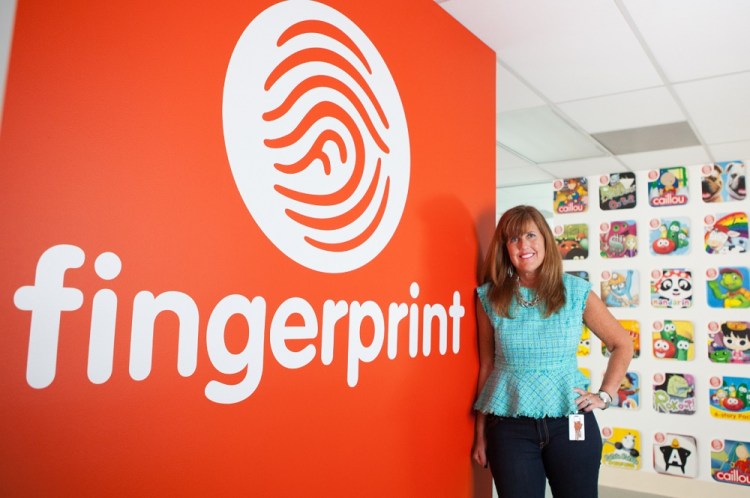GamesBeat: What’s it like being a woman running a company like this? What advice would you have for other women on that front?
MacIntyre: I find that being a woman CEO is an incredible benefit. It helps me hire a really diverse talent pool. At Fingerprint, more than half of the people here are women. About 50 percent of the engineering and product teams are women. We’re able to attract high-quality women employees, and that creates a complex group of people working together, which helps lead to great products.
The other thing that’s been interesting is that obviously there’s a lot of bias in tech. A ton’s been written about how to get more women into tech and into venture capital and into being entrepreneurs. I don’t even know where the bias really is, because I tend to think about everything from our business perspective. There’s probably a complex set of reasons to why somebody might say no to working with Fingerprint, on an investment basis or a partnership basis. I would hope that one of them isn’t me being a woman, or a middle-aged woman, or not an engineer. But you never really know. My philosophy is just to try to build a quality company and make a great product and create a fantastic reputation. Being a woman has helped with that.
GamesBeat: Where is the company now? How many partners do you have? How large is the operation?
MacIntyre: We have 30-ish employees. We’re growing every day. We’re doing business with 12 enterprise partners. The biggest ones are Samsung, Sylvan Learning, Astro in southeast Asia, Cartoon Network in southeast Asia. We haven’t announced it yet, but do you remember the Backyard Sports brand? We’re building a big sports network for them to launch in December. We’re working with some of the largest education companies at this point.
At this time last year we were working with 20 apps and five developers. Now we’re working with 120 developers in 40 countries. We have almost 100 apps in our library, and that’s growing every day. By any measurement, whether it’s apps or developers or employees or new investors, with people like DreamWorks, we’re seeing very positive progress.
GamesBeat: What’s the basic pitch to them? Is it about discovery of apps?
MacIntyre: Whether you’re a content distributor a content creator — a toy company, a pay TV company — anybody who’s interested the space has a couple of things to solve for. One, they want a direct relationship with the customer. Our technology gives them that. Two, they want to monetize their content, whether it’s games or user-generated content. They want to monetize their customers. Three, they want to be able to leverage the growth in mobile around the world. All the statistics around online video viewing, reading, education, all of those numbers are growing at high double-digit rates. You look at mobile and tablet and say, “I want to be there. I want to own that screen.”
Our pitch to content creators and distributors is fairly simple. We can give that direct relationship to the customer through a network of linked apps. They get super excited about that, because it potentially enables them to create their own channel and market that channel through their apps.
GamesBeat: Is your competition the kind of company that thinks it’s big enough to do its own platform or portal, to have its own direct relationship with customers?
MacIntyre: That’s exactly it. When we talk to some large companies, the inclination is always to want to build it inside. Whether you’re the technology guy or the marketing guy, you tend to want to own the entire system and manage it internally. But once they discover the complexities around doing that, they start to look for a partner who can present them with the technology and implement a service for them in months instead of years.
GamesBeat: With folks like Samsung, it seems like you’ve demonstrated that you can offer a benefit over rolling your own.
MacIntyre: We’re only live with Samsung in southeast Asia. There, they saw the value of offering a subscription-based service with high-quality curated kids’ learning content. They looked at the market and said, “Our consumer is likely to have children and likely to be interested in learning.” We can deliver a high-quality service and open it up to a variety of devices. This is against a landscape where there are lots of proprietary kids’ tablets in the markets and various other online services for learning. They looked at it and saw that we could deliver a high-quality service to their customers across devices.
Our relationship is with customers all across the world. Our ability to deliver localized app content in southeast Asian languages, in Mandarin, in Malay, in Tamil, and a bunch of other languages, that’s really appealing to them.
GamesBeat: How large is the audience you can potentially reach compared to what your actual user numbers are now? How can you close that gap?
MacIntyre: We don’t really talk about global numbers, because we’re not in a position to disclose our customers’ data. But one way to think about it is, there are four million kids born in the United States every year. Our target audience in the U.S. is kids three to eight, and we’re going to expand.
If we look at the global audience, it’s much bigger than that. In southeast Asia alone there are 600 million people. In round numbers, 200 million are under the age of 12. It’s quite a large audience there. Kids are interested in mobile reading, mobile video, mobile education products, and of course mobile games. It’s a super-category. Kids are not just a vertical. If you look at it globally, this is a very big business.
GamesBeat: Are you thinking about the future in any particular way, toward any particular direction you want to go?
MacIntyre: We’re focused on expanding our business with content creators and distributors on a global basis. You’re going to see us attack some new verticals that are more targeted. For example, we’ll begin to focus on true educational content that could be sold into the school environment. We’ll partner with some of the big education companies. We see the true education vertical, as opposed to edutainment, as an area we’re really interested in.
We’ll launch some video-only initiatives as well. We think that there’s an opportunity merge video and games as an entertainment experience. I hope we wake up five years from now doing business with all the largest media companies and pay TV companies and educational companies, creating a foundation for quality kids’ content on mobile networks.
GamesBeat: Is there anything else we haven’t touched on?
MacIntyre: The big learning for me has been that it’s not trivial to start a business that creates a new platform in a new category. It’s been a very interesting evolutionary process over the last four years. It’s been cool to see us get traction with consumers, developers, and enterprise partners.
Weeks ago I went to Malaysia, where I participated in what was essentially the first game developers’ conference in Malaysia. It was sponsored by our partner, Astro, which had an innovation day and a game developers’ day. They brought in people like me from around the world to talk to around 250 developers from southeast Asia there. It was amazing — one part GDC and one part Casual Connect. There were probably 15 developers making quality edutainment-oriented content that we’ll then bring into our various networks.
A lot of times you see western developers wanting to get access to the east. That’s part of what we do when we distribute content in southeast Asia. But it’s interesting for us to see that there’s a whole range of developers in a very small country all making content that could make it here in western markets. It’s a privilege to meet them and figure out how that could work with our various partners. You’ll see more of that happen as we become more established as a leader in education and game content globally.
The best is yet to come. As we begin to figure out more interesting ways to monetize our content and understand the audience, I see big things for Fingerprint and for mobile in general.
VentureBeat's mission is to be a digital town square for technical decision-makers to gain knowledge about transformative enterprise technology and transact. Learn More



